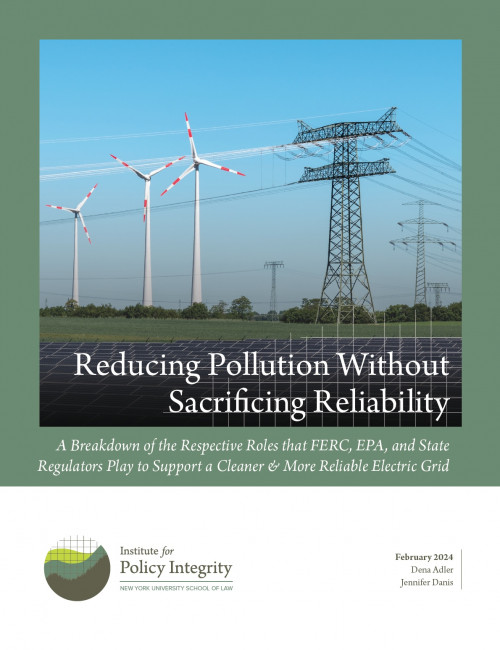-
Comments to EPA on New Effluent Standards for Meat and Poultry Facilities
In January 2024, the Environmental Protection Agency (EPA) proposed a regulation under the Clean Water Act that would impose new effluent limitations guidelines and standards for the meat and poultry products point source category. As EPA documents, the proposed standards would help improve health and water quality near these slaughterhouse facilities. It would also carry benefits stemming from better-protected habitats for a variety of wild animals. In our comment letter, we explain that, while the Proposed Rule and its accompanying regulatory impact analysis reasonably explain many of these benefits, EPA should take further steps to ensure the complete presentation of regulatory benefits and costs, along with their distribution, and to present its decisionmaking factors transparently.
-
Comments to EPA on Amendments to New Source Performance Standards and Emissions Guidelines for Large Municipal Waste Combustors
In January, the Environmental Protection Agency (EPA) proposed a rule that would amend new source performance standards and emissions guidelines for large municipal waste combustors. The Proposed Rule marks an important, and overdue, step in reducing harmful pollutants from municipal waste combustion. To ensure that EPA regulates in a manner that maximizes social welfare, without leaving potential net benefits on the table, the Institute for Policy Integrity submitted comments recommending that EPA conduct additional analysis. -
Policy Integrity Recommendations Reflected in Amendments to EPA’s RMP Rule
In February 2024, EPA finalized amendments to its Risk Management Program (RMP), under Section 112(r) of the Clean Air Act, to better protect vulnerable communities from chemical disasters that release toxic air pollution. In line with Policy Integrity’s recommendations, the final rule has been strengthened relative to the proposal and includes considerably more attention to the issues of underreporting, unquantified benefits, and the risks of catastrophic incidents. EPA has further improved the final rule to include consideration of climate change-related hazards in line with Policy Integrity’s recommendation to cover climate change-exacerbated hazards in addition to climate change-caused hazards. This will be increasingly important as the risks and magnitude of future chemical incident damages will likely only grow as climate change exacerbates severe weather that can spur power outages and chemical disasters.
-

Reducing Pollution Without Sacrificing Reliability
A Breakdown of the Respective Roles that FERC, EPA, and State Regulators Play to Support a Cleaner & More Reliable Electric Grid
Multiple federal and state regulators must coordinate their efforts to ensure electric grid reliability, particularly during a period of major transition, and it is important to understand what role each of them plays. This report reviews the respective roles of FERC, RTOs/ISOs, other transmission operators, state public utility commissions, and state environmental regulators. EPA’s duty to reduce GHG emissions that endanger public health and FERC’s duty to steward grid reliability will require them to coordinate each other’s respective expertise as they work with RTOs/ISOs, state regulators, and utilities to implement EPA rules.
-
Comments to EPA on Draft Scientific Integrity Policy
On February 23rd, Policy Integrity submitted comments to EPA on its draft Scientific Integrity Policy. The draft Policy appropriately clarifies that economic analyses are protected by the same integrity policies as other scientific assessments, but it currently cites EPA's 2010 Guidelines for Performing Economic Analyses as the only example of a best-practice document that "should be followed" when assessing benefits, costs, and economic impacts. Several key elements of those 2010 guidelines are out of date, notably the recommendations on discount rates. Our comments offer a simple redline to ensure that other documents that meet the standards for objectivity--like the updated Circular A-4, or the pending ecosystem service guidance--could also fall under the Policy's proposed protections.
-
Comments to EPA on Draft Revision of Technical Guidance for Assessing Environmental Justice in Regulatory Analysis
EPA seeks comments on the it's Draft Revised EJ Technical Guidance, which highlights technical approaches that analysts can use to evaluate environmental justice concerns in regulatory actions. The Institute for Policy Integrity's comments to the agency advocate for enhanced documentation and transparency in environmental justice assessments.
-
Supplemental Comments to EPA on Reliability & the Proposed GHG Regulations for Fossil Fuel-Fired Power Plants
In May 2023, the Environmental Protection Agency (EPA) proposed a package of regulations to limit greenhouse gas emissions from fossil fuel-fired power plants under Section 111 of the Clean Air Act. EPA subsequently issued a supplemental notice of proposed rulemaking, re-opening its comment period and soliciting comment on whether to include additional mechanisms to address potential reliability issues. In these comments, we explain why EPA has engaged in reasoned rulemaking and developed a robust administrative record comporting with its mandate to reduce power sector pollution. It remains the Federal Energy Regulatory Commission’s (FERC’s) responsibility to ensure reliable bulk-power system (BPS) operations and to use its corresponding tools to address the wider reliability challenges of the clean energy transition, in coordination with other reliability-related entities.
-
Comments to EPA on Proposed Regulation of Trichloroethylene (TCE)
In October, EPA issued proposed restrictions on the manufacture, processing, and distribution of a chemical called trichloroethylene (TCE). We argue in comments that aspects of the agency’s Economic Analysis of the proposed restrictions could be clarified or expanded upon to better inform policymakers and the broader public about the benefits of ending TCE use.
-
Policy Integrity Scholarship and Advocacy Shapes EPA’s New Climate Damage Valuations
On December 2nd, EPA released a new methane regulation that includes final updated values for the social cost of greenhouse gas metrics. The updated metrics align with many of the recommendations Policy Integrity made in our comments on the draft values, and our scholarship and analysis were cited heavily in the associated federal documentation.
-
Comments to EPA on the Proposal to Limit Emissions from Reclassified Major Sources of Air Toxics
In November 2020, EPA finalized a rule withdrawing the “Once-in, Always-in” Policy, under which facilities that are “major sources” of emissions at the first compliance date for the applicable standard must comply permanently with the requirements for a major source. This 2020 Rule allows major sources of toxic air pollution to reclassify as area sources, which are subject to less stringent or no emission control requirements. The 2020 Rule therefore creates the potential for very large increases in toxic air pollution. In September 2023, EPA proposed new safeguards to prevent increased emissions from sources that reclassify and restores federal enforceability requirements for potential to emit limits. We submitted comments on the analysis underlying the proposed new safeguards.
Viewing recent projects in EPA











